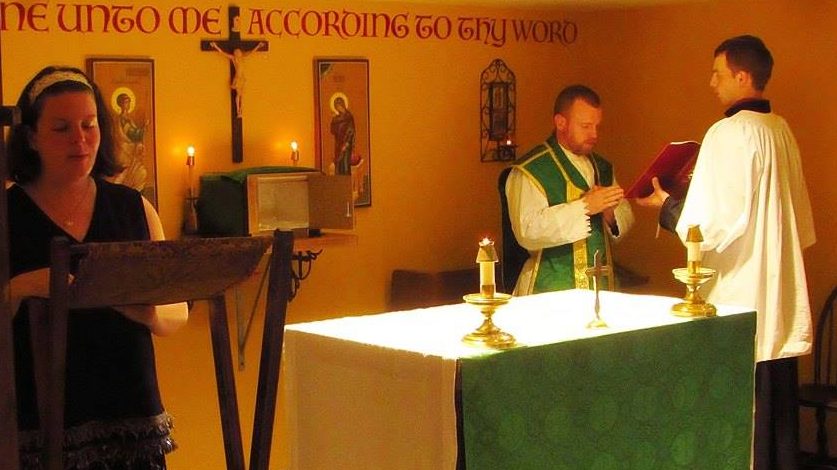Bringing out the scripture…
As we prepare for the Third Edition of the Roman Missal beginning this Advent, we will continue examining some of the changes to the people’s parts of the Mass in the new English translation. We will look now at the Preface Dialog.
This is the part of the Mass where the priest says “Let us give thanks to the Lord our God,” and the people reply, “It is right to give him thanks and praise.” From now on, in the new translation, we will be replying, “It is right and just.” Period.
Why the change? Let’s go back to the Latin. In the official Latin text, the people reply, “Dignum et iustum est.” Even if you don’t know what dignum and iustum mean, you see the et “and” and the est “is.” It is “this” and “that.” Period. Very simple and very to the point. Once more, the new translation is simply remaining faithful to the text of the original liturgical document.
The same is true of the last part of the Mass I want to look at specifically, the Ecce Agnus Dei. The way the new translation is rendered not only more closely follows the Latin, it also alludes much more to Sacred Scripture (which the original Latin also does). Here is the Latin with the old and new translation.
ORIGINAL LATIN
Priest: Ecce Agnus Dei, ecce qui tollit peccáta mundi. Beáti qui ad cenam Agni vocáti sunt.All: Dómine, non sum dignus, ut inter sub tectum meum, sed tantum dic verbo et sanábitur anima mea.
FORMER TRANSLATION
Priest: This is the Lamb of God who takes away the sins of the world. Happy are those who are called to his supper.
All: Lord, I am not worthy to receive you, but only say the word and I shall be healed.
NEW TRANSLATION
Priest: Behold the Lamb of God, behold him who takes away the sins of the world. Blessed are those called to the supper of the Lamb.
All: Lord, I am not worthy that you should enter under my roof, but only say the word and my soul shall be healed.
This part of the Mass is full of allusions to Sacred Scripture. The first is from John 1:29. John the Baptist sees Jesus coming toward him and says, “Behold the Lamb of God, who takes away the sin of the world.” Next, the priest says, “Blessed are those called to the supper of the Lamb.” Note that we now hear the word “blessed” where before it was “happy.” In Latin, blessed is beati, which is what we see in the original. Happy would be felix or leatus (joyful), neither of which are present in the text. In any case, this is a reference to Rev. 5:19 and John’s vision of the heavenly banquet.
The third Scriptural reference here is in our response. This comes from the story found in Mat. 8:5-13.
When he entered Capernaum, a centurion approached him and appealed to him, saying, “Lord, my servant is lying at home paralyzed, suffering dreadfully.” He said to him, “I will come and cure him.” The centurion said in reply, “Lord, I am not worthy to have you enter under my roof; only say the word and my servant will be healed. For I too am a person subject to authority, with soldiers subject to me. And I say to one, ‘Go,’ and he goes; and to another, ‘Come here,’ and he comes; and to my slave, ‘Do this,’ and he does it.” When Jesus heard this, he was amazed and said to those following him, “Amen, I say to you, in no one in Israel have I found such faith. I say to you, many will come from the east and the west, and will recline with Abraham, Isaac, and Jacob at the banquet in the kingdom of heaven, but the children of the kingdom will be driven out into the outer darkness, where there will be wailing and grinding of teeth.” And Jesus said to the centurion, “You may go; as you have believed, let it be done for you.” And at that very hour [his] servant was healed.
This Scripture reference was hidden somewhat in our previous English translation, or at least it was not made apparent. The words we will be saying in the new translation, come Advent, may at first sound strange coming out of our mouths, but this is probably just because we are so used to the other. Change is never easy for anyone. But it will help us to remember that this new translation has our words more closely following the words of the centurion, confessing his unworthiness before the Lord, and at the same time acknowledging his authority and his power, and asking him humbly for healing. What an awesome time for us to remind ourselves of that, as we prepare to receive the Body and Blood of our Lord in the Holy Eucharist.
I know that some people have received the news of these changes in the Mass with trepidation. I know that others have looked forward to them with great joy and anticipation. Regardless, my prayer for us all is that we take this opportunity to truly think about the words we say in the liturgy, to catechize ourselves, or perhaps re-catechize ourselves as to the mystery and the meaning of the Mass, so that we can approach this sacrifice with prayer, humility, thanksgiving and reverence for this wonderful gift which God has given us and which the Church has so carefully handed down to us.
God bless!

